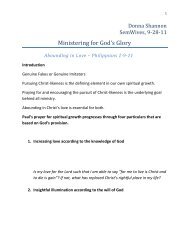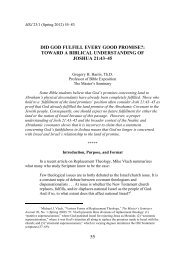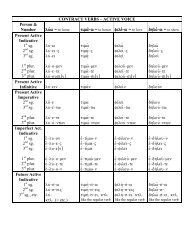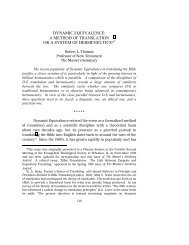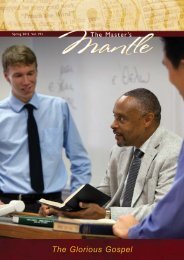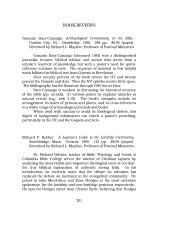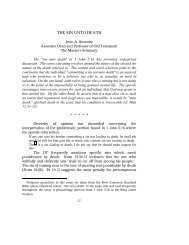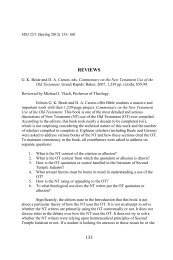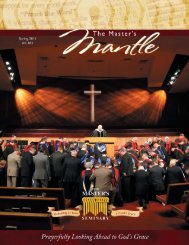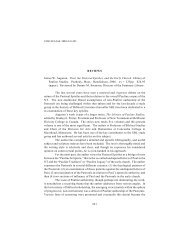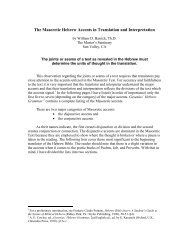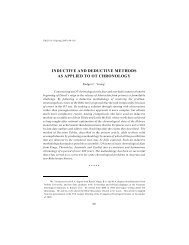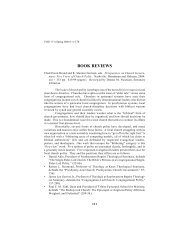The Dispensational View of the Davidic Kingdom - The Master's ...
The Dispensational View of the Davidic Kingdom - The Master's ...
The Dispensational View of the Davidic Kingdom - The Master's ...
You also want an ePaper? Increase the reach of your titles
YUMPU automatically turns print PDFs into web optimized ePapers that Google loves.
216 <strong>The</strong> <strong>Master's</strong> Seminary Journal<strong>the</strong> view that <strong>the</strong> church in its present form is unrelated to and distinctfrom <strong>the</strong> <strong>Davidic</strong> kingdom.This essay argues that <strong>the</strong> rejection, postponement, and entirelyfuture fulfillment <strong>of</strong> <strong>the</strong> <strong>Davidic</strong> kingdom is and has been aconsistently held view within "normative" dispensationalism. 7 Itfur<strong>the</strong>r argues that this position serves as a distinguishing feature <strong>of</strong>dispensationalism, differentiating it from non-dispensational <strong>the</strong>ology.<strong>The</strong> progressives reject this position and consequently at least blur <strong>the</strong>distinction between dispensational and non-dispensational views. 8<strong>The</strong> first section <strong>of</strong> this essay will examine <strong>the</strong> rejected/postponed<strong>Davidic</strong> kingdom view throughout <strong>the</strong> history <strong>of</strong> dispensationalism,beginning with <strong>the</strong> work <strong>of</strong> John Nelson Darby. This section will alsoexamine how non-dispensationalists note this concept withindispensationalism. <strong>The</strong> second section will assess <strong>the</strong> currentlandscape, giving attention to <strong>the</strong> rejected/postponed <strong>Davidic</strong>kingdom view in PD. Next will follow a look at <strong>the</strong> ramifications <strong>of</strong><strong>the</strong> current discussion for normative dispensationalism. However, inorder to interact with <strong>the</strong> claims <strong>of</strong> Blaising concerning whe<strong>the</strong>r <strong>the</strong>dispensational tradition <strong>of</strong> <strong>the</strong> kingdom has changed, a discussion <strong>of</strong><strong>the</strong> meanings <strong>of</strong> "development" and "change" is in order.<strong>Kingdom</strong> Distinctions in Normative <strong>Dispensational</strong>ismCharles C. Ryrie has argued for <strong>the</strong> need to distinguish between<strong>the</strong> concepts <strong>of</strong> development and change, and this is especially true interms <strong>of</strong> examining <strong>the</strong> history <strong>of</strong> doctrines and doctrinal systems. Hesums up his discussion by noting, " (1) development and change arenot synonymous but have different meanings; and (2) in order todecide whe<strong>the</strong>r something is developing or changing one must7<strong>The</strong> term "normative" follows Larry Crutchfield, <strong>The</strong> Origins <strong>of</strong> <strong>Dispensational</strong>ism:<strong>The</strong> Darby Factor (Lanham, Md.: University Press <strong>of</strong> America, 1992) 23-42. It includes<strong>the</strong> entire dispensational tradition (classic and revised), excluding <strong>the</strong> progressives.8Cf. "<strong>The</strong> essence <strong>of</strong> dispensationalism, <strong>the</strong>n, is <strong>the</strong> distinction between Israel and<strong>the</strong> Church," Charles C. Ryrie, <strong>Dispensational</strong>ism Today (Chicago: Moody, 1965) 47; cf.idem, <strong>Dispensational</strong>ism (Chicago: Moody, 1995) 41.



